The Santa Barbara Film Festival awards have been announced, and the highlights are: (a) Independent Audience Choice for Best Feature for Best Feature went to Logan Smalley‘s Darius Goes West: The Roll of His Life; (b) The American Spirit Award went to Michael Schroeder‘s Man In The Chair, starring Christopher Plummer and Michael Angarano; (c) The Best International Feature Film Award went to Beauty In Trouble; (d) the Gold Vision Award winners are Spiral, directed by Adam Green and Joel David Moore and starring Moore, Amber Tamblyn and Zachary Levi; (e) the Nueva Vision Award for the best Spanish and Latin American film went to Daniel Sanchez Arevalo‘s DarkBlueAlmostBlack; and (f) the award for Best Documentary went to Dan Klores‘ Crazy Love.
Day: February 4, 2007
“Pans” is highest-ranked
This weekend Guillermo del Toro‘s Pan’s Labyrinth “became the highest-grossing Spanish-language film released in the U.S., passing Like Water for Chocolate with a cume of $21.7 million,” according to Variety‘s Ian Mohr.
Best Picture musings
I don’t know what’s going on with the Best Picture race. More than a couple of people have said since the Oscar noms were announced that Little Miss Sunshine probably can’t make it, not without an accompanying Best Director and/or Best Editing nomination, which it doesn’t have. Will Babel pull through after all? Will Academy voters take a look at that 11th place box-office showing for the re-released The Departed this weekend and say, “Wow…still an earner” and give it the Oscar out of monetary respect? The Queen and Letters From Iwo Jima can’t take it…right? I’m lost.
Clooney on U.S. impotence
“The United States [has] been able to broker [peace agreements] at other times. Obviously we did not do anything in Rwanda, but we played a big part with NATO in ending the Bosnian situation. We used to be able to do that. But in our meetings with all of the heads of government they said to us, “Your policies in Iraq have made it impossible for you now to threaten anything.” We have no moral high ground. We have to look to anyone but ourselves to be able to broker some sort of a peace treaty. That is a very frustrating place to be.
“I was taught [when growing up] to look at the United States not from the inside out but from the outside in. The signs you see [today] are very disheartening. It is probably the worst time ever for us internationally. When you go to Europe, for the most part, they just hate us. Not individually, but they think we are just like these big bullies — and quite honestly, we have acted like that. That has been the most unusual twist in the last few years, having to defend being an American.” — George Clooney speaking to Newsweek‘s Ginanne Brownell in the 2.12.07 issue.
Boogey-man black guys
In a piece that asks if the Academy Awards are “color-blind at last,” Newsweek‘s Sean Smith and Allison Samuels note that “a segment within black Hollywood believes that white Academy voters reward black actors for roles that reinforce stereotypes — the angry black man, the noble slave, the sexualized black woman — rather than challenge them.
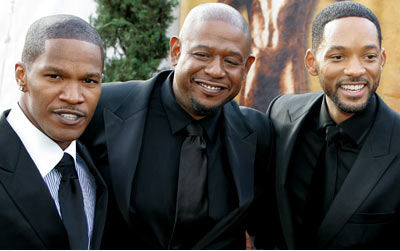
“There’s a sense that in order to be embraced by the white community, you probably did something that violates your integrity within the black community,”actress Kerry Washington, who stars opposite Forest Whitaker in The Last King of Scotland, tells Smith and Samuels.
And yet isn’t this precisely what N.Y. Press critic Armond White said about Whitaker’s Idi Amin in his Last King review? That it’s “another scary black man stereotype…by scaring the daylights out of his white sidekick (i.e., James McAvoy), Whitaker’s showcase comes off as little more than a super Training Day: King Kong Idi Amin.
“What rouses a thinking viewer’s skeptic is that the film is a deliberate fabrication. Screenwriter Peter Morgan (who also scripted Helen Mirren‘s sympathetic impersonation of Elizabeth II in Stephen Frears‘ The Queen), adapts this up-close view of Idi from a novel by Giles Foden that has scant basis in fact. There was no white Scottish confidante among Amin’s personnel.
“This simply continues that same ‘whites-first’ tactic in Cry Freedom and Mississippi Burning, where black characters are considered insufficient to dominate a narrative. The Last King of Scotland never tries to imagine Idi’s psychology or a black African perspective; Morgan leaves history to justify every demonizing cliche.
“It’s rare when a black movie actor is not playing a stereotype that comes from white fear and ignorance,” White wrote. “For that reason, it’s hard to get behind the hyperbolic acclaim for Whitaker’s sub-Emperor Jones star turn. The performance has Whitaker’s customary nuance, idiosyncratic gentleness and subtle power, so why do critics now pretend that Whitaker has created an indelible characterization?
“Critics duly noted Whitaker’s delicately detailed, deeply felt performances in Johnny Handsome, A Rage in Harlem, The Crying Game, Ghost Dog, Phone Booth and Panic Room — without crying out for Academy commendation. Those performances validated the broad span of American personality; Whitaker could be warmly masculine while changing perception of what was heroic. To single-out Whitaker’s Idi merely justifies the black stereotyping that Whitaker had avoided ever since his breakthrough in Clint Eastwood‘s 1988 Charlie Parker biographer Bird.”
“Once” going out in the summer
Most Sundance pickups are released several months later, and sometimes not until early the following year, but Fox Searchlight will be putting John Carney’s Once into theatres in late May or early June and keep it going all through the summer. A word-of-mouth campaign, territory by territory, modest ad buys, viral marketing. Costars Glen Hansard and Marketa Irglova will go on tour around the country to help get the word out. I got this information last night from Fox Searchlight marketing chief Nancy Utley at the Santa Barbara Film Festival/Forest Whitaker party.
Santa Barbara pics
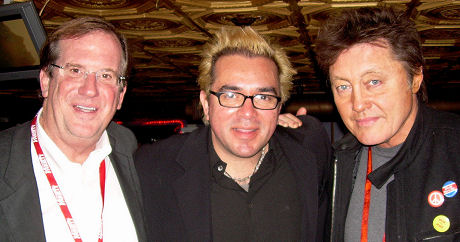
(l. to r.) Pete Hammond, Santa Barbara Film Festival director Roger Durling and some other guy at a festival party earlier this week; Saturday’s composers panel; a lot of people at last night’s Forest Whitaker party felt that the go-go dancers were appealing but a bit too Vegas-y and incongruent; a beautiful woodie parked in front of Trancas market on Saturday; Babel co-star and Best Supporting Actress nominee Adriana Barraza, Roger Durling following “Women in the Biz” panel.
“Departed” sequel + Brad Grey
TMZ.com’s Claude Brodesser-Akner is reporting that “insiders [are saying] that Warner Bros. was caught by surprise at an unexpected announcement of a Departed sequel in the press by the loose-lipped Mark Wahlberg — the only surviving principal character from the first film. And as a result, the follow-up project’s planning is vastly complicated,” largely because of questions about the participation of Paramount Pictures chief Brad Grey.
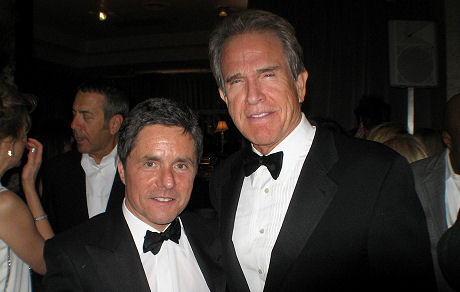
Paramount honcho Brad Grey, Warren Beatty at the Paramount party on Golden Globes night
“In fact, insiders say that all deals associated with the project are on hold until the studio can figure out what Grey’s involvement would be,” Brodesser-Akner writes. “After all, before he was chairman of Paramount, he helped create Brad Pitt‘s production company at Warner Bros., which developed the present-tense, Oscar-nominated Departed.
“Grey declined to speak to TMZ about what role he’d have in the new Departed, But now that the news of a planned sequel is out of the bag, things are complicated: For one thing, it’s being made at a rival studio, putting Grey in an odd, conflicted position if he is produces it for Warners. For another, if Grey pushes to be the sequel’s producer, it might signify that he’s thinking of packing a parachute because he suspects he’ll soon be out of a job at Paramount.
“Grey’s future is a matter of open speculation in Hollywood these days: Having just last month fired his studio president, Gail Berman, after a tumultuous run, Grey appears embroiled in a battle for control of the studio with DreamWorks co-founder David Geffen. It was Geffen who last year brought in Universal Pictures chairwoman Stacey Snider to run the now Paramount-owned DreamWorks.
“As the Times‘ Claudia Eller noted on 1.29, “Though Grey signed off on her hiring, the move was widely viewed as an effort by Geffen to position Snider for Grey’s job.”
Matthews on Lecter’s legend
Anthony Hopkins‘ portrayal of Hannibal Lecter in The Silence of the Lambs “was one for the ages,” recalls N.Y. Daily News critic Jack Matthews. “With only 16 minutes of screen time, he turned the creepy psychotic genius into the most indelible screen villain of all time, a standing made official four years ago when Hannibal was No. 1 in the American Film Institute’s poll of the 100 top villains. (Second and third place went to Norman Bates and Darth Vader.) Lambs even won Hopkins the 1991 Academy Award for Best Actor.
“Hannibal Lecter has Hopkins — as much as his creator, author Thomas Harris — to thank for his notoriety. Hopkins’ performance in Lambs was electrifying, one of the rare occasions where a movie actor gets under the skin of an outsized literary character and makes him larger, more frightening, more dangerous, more real, and yet — here’s the key — irresistible.
“What was it in that hiss, in the menacing evenness of his voice (‘Good eveninggg, Clarice’) that sent chills up our spine and drew us to him at the same time? It’s great acting, of course, but it’s more. I think audiences could see through the character to the joy and playfulness of the actor inside. Hopkins knew he had the role of a lifetime, and we could tell he wasn’t letting it go by.” — from a piece in which Matthews is looking to talk about the forthcoming Hannibal Rising (Weinstein Co., 2.9) without talking about it.
Mafioso bloggers
I never responded to the most oft-voiced comment about the opening-page art for that Los Angeles magazine piece about “The Blog Whisperers,” which is that David Poland looks like either Clemenza or Don Barzini…some scary guy from Little Italy. That led to a thought about whether any other entertainment or Oscar-blog writers remind anyone of any character in either The Godfather films or on The Sopranos.
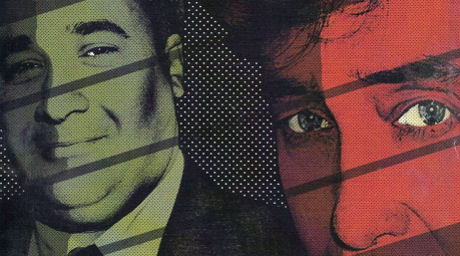
Pete Hammond doesn’t remind me of any mafioso types — too amiable and industry-centric, zero malevolence, too much laughter and good will.
I can’t think of any character whom N.Y. Times Oscar guy David Carr might be either except, on a reach, a blend of two Sopranos characters — Jerry Adler‘s ‘Hesh’ Rabkin plus Peter Reigert‘s State Assemblyman Ronald Zellman.
Sasha Stone is not Connie Corleone or Carmela Soprano, but I could make a case for her being a blend of Dr. Jennifer Melfi with a tiny sprinkling of Annabella Sciorra‘s steak-throwing car dealer, Gloria Trillo.
In Contention‘s Kris Tapley sees himself as blend of Clemenza and Tom Hagen. I say he’s young Michael Corleone just when he’s convincing Sonny that he’s got the steel to shoot Virgil “The Turk” Sollozzo in that Bronx restaurant.
Tom O’Neil doesn’t have a gang bone in his body (okay, maybe a little tiny bit of John Ventimiglia/Artie Bucco) but Coming Soon‘s Edward Douglas could be…I’m lost. Drawing a blank. Any thoughts on anyone else? Who’s Devin Faraci?
I’m obviously not the best judge, but I would say I’m made up of one part Christopher Moltisanti (as played by Michael Imperioli on The Sopranos), one part Tom Hagen/Robert Duvall and one part Sonny Corleone/James Caan.
Postscript: One of the above-named voices wrote in around 3:30 pm to say that Poland reminds him/her of Sterling Hayden‘s Capt. McCluskey, the guy who got shot along with Sollozzo by Michael Corleone.
Director praises “Children”
“I saw Children of Men yesterday. Its not just great — it’s holy shit great. With clearly the most imaginative and inspired cinematography since Seven (in terms of the innovation of the work, which, in this case, was how well the camera moves). This is easily the best film of the year. Nothing comes close. It got shut out of the Oscar race because of a horrible Oscar campaign, or lack of one.” — a prominent feature film director who sometimes passes along this and that thought, often on Sunday mornings.
Kane finishes off Murphy
A fully reasoned, highly persuasive New York Post piece by Michael Kane, arguing against the notion of Eddie Murphy as a deserving Best Supporting Actor nominee, appeared this morning. It’s very surprising, I’m thinking, that the most devastating quote against the guy is delivered in the article by Oscarwatch.com‘s Sasha Stone, who’s said I’ve got my head screwed on backwards for trying to articulate the anti-Murphy current.
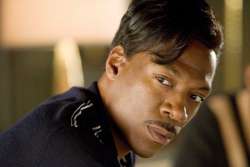
Murphy “has a 90 percent chance of winning right now,” she says. “And I’m getting the sense that he doesn’t even care. He’s been prickly through this whole thing. He doesn’t want to let his guard down. He doesn’t want to look desperate or appear desperate. You can tell he’s up there trying to say the right things, going through the motions, but maybe deep down he thinks it wasn’t really Oscar-worthy.”
“Norbit,'” Stone says, “is really not the best Eddie Murphy to be showing right now. What if you’re an Oscar voter, and you drive by that giant billboard on Ventura Boulevard? Maybe you start thinking, this movie is probably going to make $100 million. Let’s give the award to poor Jackie Earle Haley, who has nothing. Eddie Murphy doesn’t need an Oscar.”
“Let’s face it, he’s really very good in [Dreamgirls], on stage,” another observer says in the piece. “It’s not just that he can sing. He’s got the moves. He knows how to do it.It’s like an extended James Brown impression. Is that great acting? That’s okay acting. He did the job. But there’s no basis for him to be saluted and put up on the mountaintop.
“Eddie Murphy may well have something to show that proves that he’s a good actor, but Dreamgirls‘ and the role of James Thunder’ Early is not that role. It’s basically prancing around on stage.”
The odd thing is, Kane writes, is that “this kind of criticism may not even get an argument from Murphy himself.
“Even he dismisses his supposed ‘Oscar clip’ in Dreamgirls, a scene that comes late in the film, when his character is down on his luck and reaches for heroin to ease the pain. When a friend asks him to stop, ‘Thunder’ Early shoots him a look that without words fully captures the moment of surrender of a proud man.
“But even Murphy, true to form, laughs off the artistry of the acting.
“‘After that scene was shot,’ recalled Murphy after winning the Golden Globe, ‘our producer, Laurence Mark, said, ‘Oh, that look you just gave him was incredible.’ And I was like, ‘What’s he talking about?’ I didn’t know what he meant.
“And then [co-star] Jamie [Foxx] came over a week later and said, I saw that look that you did.’ And then I watched the movie, and I was like, what the f— are they talking about? Everyone was like, Oh, that moment,’ and I was like, I didn’t do nothing.'”
